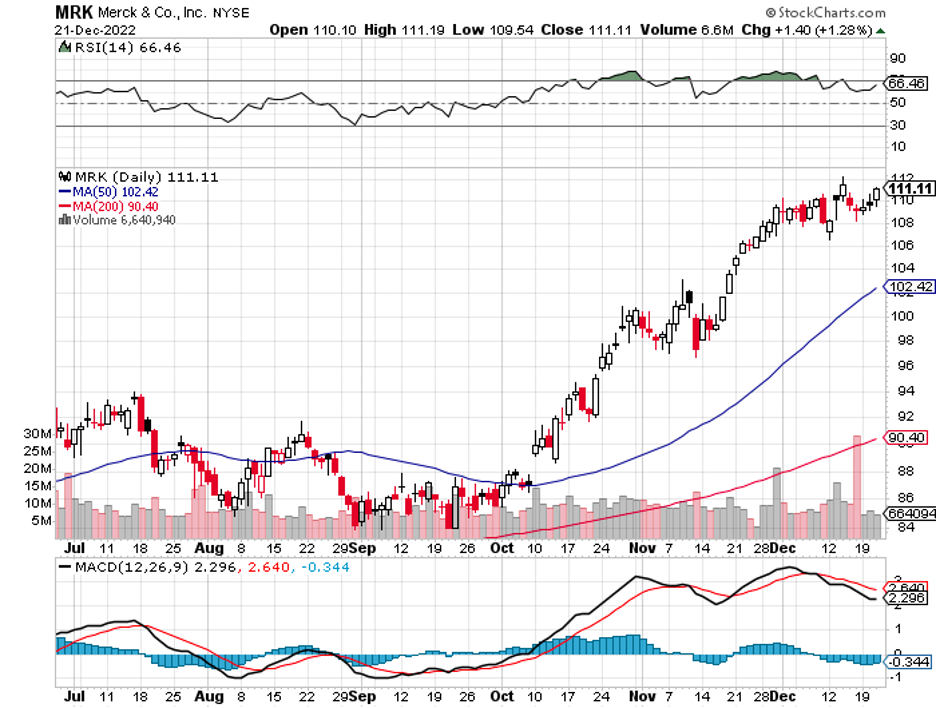An Invincible Stock That Can Weather Any Storm
Given the volatility of today’s market, anxious investors look into dividend stocks for safety and security. After all, dividends are excellent sources of passive income—something that would definitely be handy when facing a 40-year-high inflation and seemingly never-ending market losses.
However, not all companies that pay out dividends are created equal. With the current economic climate and financial turmoil, choosing businesses that would less likely lower or suspend their payouts becomes even more crucial.
One of the companies that meet these qualities in the biotechnology and healthcare sector is Merck (MRK).
Merck is one of the biggest biopharmaceutical companies across the globe, with a remarkable portfolio of drugs and treatments.
Merck’s resiliency at a period when so many companies have been struggling to keep afloat has indubitably attracted investors’ attention. One of its recent accomplishments is the promising results of its personalized cancer vaccine project with Moderna (MRNA). Needless to say, this will be a massive game-changer if the two companies manage to successfully launch the product.
However, none is more widely known among its products than Keytruda, with the drugmaker continuously raking more indications for its crown jewel with no signs of stopping anytime soon.
Keytruda contributes a considerable share of the company’s total revenue. This cancer therapy is also the fastest-growing treatment when it comes to sales. In the third quarter alone, Keytruda generated $5.4 billion, growing by an impressive 20% year over year. This accounts for more than 33% of Merck’s top line, which showed off a 14% jump year over year to reach $15 billion in the third quarter.
On top of expanding the application of Keytruda to cover new indications, the company has been developing a version of the treatment that can be given subcutaneously rather than the current intravenous delivery method.
Offering Keytruda as a subcutaneous injection or a shot administered into the fatty tissues just beneath the skin would notably reduce the future damage that biosimilars could inflict on the top-selling treatment in 2028. This is because patents protecting this particular formulation of Keytruda could be extended until the late 2040s.
Apart from that, Keytruda’s subcutaneous version would be able to provide several advantages over the current intravenous delivery method. For one, the time needed to administer the drug would be substantially reduced from the current 30 minutes since patients can easily self-inject in their own homes. This will also decrease their dependency on hospitals.
This version would also ease the discomfort of patients and significantly lower their expenses, which will consequently motivate more insurance companies to opt to prescribe this branded product instead of the biosimilar alternatives.
Other critical products in Merck’s portfolio include its HPV vaccines Gardasil and Gardasil 9. The two managed to deliver combined sales of $2.3 billion in the third quarter, which recorded a 15% jump from their performance in the same period in 2021. Meanwhile, cancer treatment Lynparza racked up $284 million, which was up by 16% year over year.
Overall, Merck has a solid lineup of products and treatments and an extremely promising pipeline of candidates, which would allow the company to develop additional blockbuster drugs to beef up its portfolio. Moreover, its stable business will undoubtedly help to sustain its dividend.
To date, Merck shares offer a 2.68% yield. This surpasses the average of S&P 500, which is 1.82%. More impressively, the company has boosted its dividend payouts by roughly 20% in the last three years despite the pandemic and severe financial and economic turbulence. Looking at its history and trajectory, Merck will most likely continue to reward its investors with dividend boosts in 2023 and beyond, regardless of what the market throws at it next.

